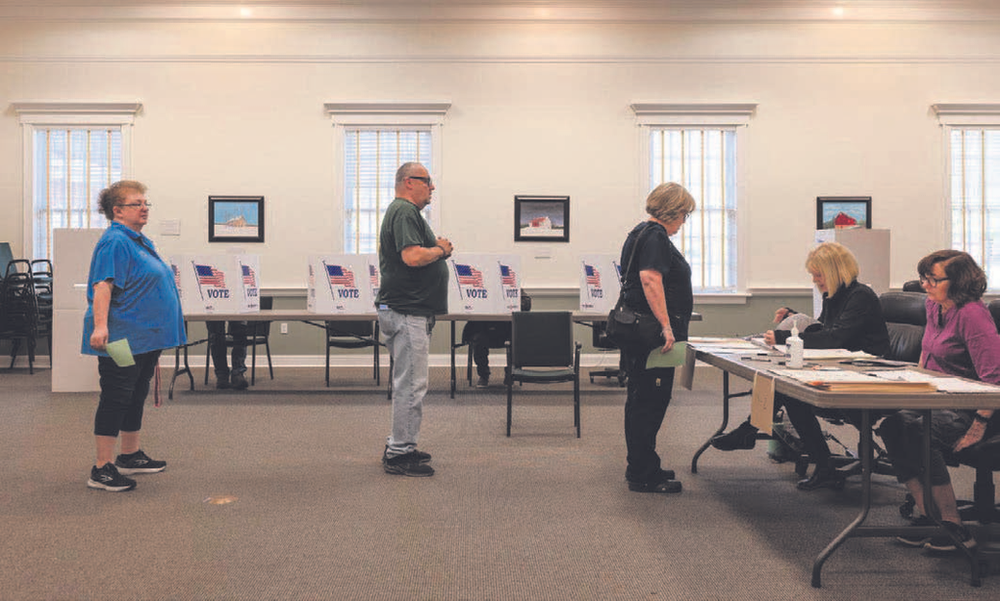
By Danny Hakim, Alexandra Berzon and Nick Corasaniti
In anticipation of the November elections, Republicans have initiated a surge of lawsuits contesting voting regulations and processes, paving the way for what may escalate into a much larger and more contentious legal dispute regarding the White House post-Election Day.
This wave of litigation, primarily emerging in recent weeks, encompasses nearly 90 lawsuits lodged nationwide by Republican entities this year. According to Democracy Docket, a group aligned with the Democrats that monitors election-related cases, this legal maneuvering has already exceeded three times the number of lawsuits filed prior to Election Day in 2020.
Experts in voting rights suggest that this legal initiative seems to be a strategy to prepare for contesting the presidential election results after Election Day in the event that former President Donald Trump, the Republican candidate, loses and refuses to acknowledge his defeat as he did four years ago. The lawsuits are largely focused in swing states and significant counties likely to influence the election outcome. Some allegations are based on discredited theories regarding voter fraud and claims of stolen elections that Trump has propagated since 2020.
In Pennsylvania’s Montgomery County, the state’s third-largest county, the party is attempting to compel local officials to manually count ballots, invoking debunked conspiracy theories concerning compromised voting machines. A lawsuit recently filed by the Republican National Committee in Nevada erroneously claims that around 4,000 noncitizens voted in the state in 2020, a statement previously dismissed by the state’s leading election authority, who is a Republican.
Should the Republicans succeed, their lawsuits would effectively narrow the electorate, primarily disqualifying voters who are more likely to align with Democrats. They are advocating for purges of voter rolls, contesting executive actions from President Joe Biden aimed at broadening ballot access, and imposing stricter regulations on voting by mail.
Election experts, including some from within the Republican Party, assert that most of the cases are likely to be unsuccessful, either because they were submitted too late or because they rest on unfounded or outright false assertions.
The sheer volume and timing of these cases, along with pronouncements from party officials and Trump supporters, indicate a broader objective: laying the foundation to dispute results post-vote. The claims made in the lawsuits may resurface—either in judicial settings or in media discourse—if Trump challenges the election outcome.
New faces, new strategy
The heightened legal initiative signifies a strategic risk for the RNC. Traditionally, the party focused its efforts on voter turnout—financing extensive organizing campaigns involving door-to-door canvassing, phone banking, and voter tracking. However, this year, the Republicans and the Trump campaign have largely delegated these responsibilities to supporting organizations and shifted resources towards legal battles and other related election integrity efforts.
Many leaders involved are new to the party’s legal framework. However, Bresso has a background as a mainstream Republican election lawyer. She previously served on the federal Election Assistance Commission and was associated with a GOP election law practice, Holtzman Vogel. Although she has remained relatively silent regarding Trump’s unfounded claims about the 2020 election, it seems her perspectives may have evolved.
During the early months of the pandemic, she co-authored an editorial asserting that state and local authorities should be granted “flexibility” to respond to the crisis and that expanding mail-in voting options “might be part of the solution,” albeit with the caveat that it was “no cure all.”
This viewpoint was subsequently rejected by Trump-aligned Republicans, who considered the increase in mail-in voting as an effort to manipulate the election. Following the 2020 election, Bresso attributed the current situation to “the landscape created by changes in voting procedures during COVID.”
Since then, Bresso has frequently participated in gatherings of the Election Integrity Network, a prominent group of activists who either promote or subscribe to conspiracy theories about voting. During a 2022 discussion panel, she encouraged attendees to “become poll workers,” emphasizing the need for vigilance in the electoral process.
Under her guidance, the RNC has initiated several lawsuits aimed at limiting mail-in voting, with ongoing cases in Pennsylvania, Nevada, Michigan, and North Carolina.
Additionally, the committee has pursued the removal of voters from the rolls, lodging recent lawsuits based on false assertions that Democrats are enrolling large numbers of undocumented immigrants to vote. Some of these lawsuits have already been dismissed.
“Democrats continue to prioritize noncitizens over American citizens by permitting noncitizens to vote,” stated Michael Whatley, chair of the RNC, in a recent announcement regarding the Nevada lawsuit.
Research on prosecutions and state voter records indicates that it is extremely uncommon for noncitizens to participate in voting.
“What they need in court is evidence,” remarked Ty Cobb, a former White House attorney during Trump’s administration, who expressed regret over the resurgence of old falsehoods. “They lacked that previously, and it’s improbable they will possess it this time.”
